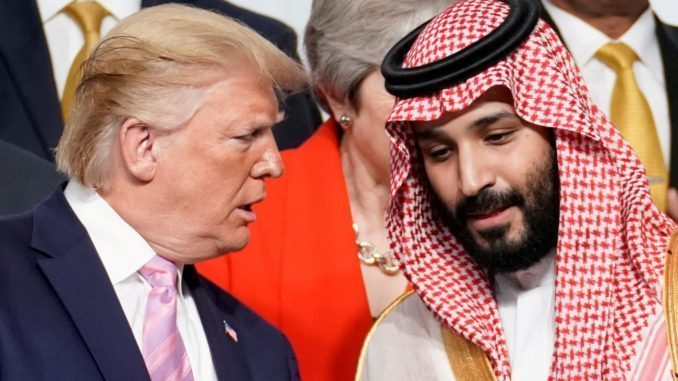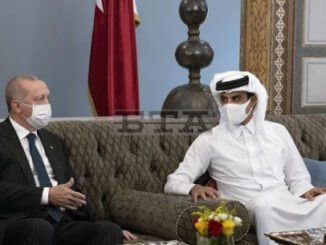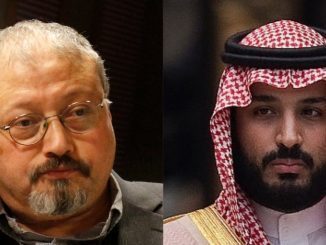
Saudi Arabia’s sovereign wealth fund has bought minority stakes in major American companies including Boeing (NYSE:BA), Facebook (NASDAQ:FB) and Citigroup (NYSE:C), a regulatory filing showed, giving it a portfolio of nearly $10 billion in U.S.-listed stocks. Meanwhile, Saudi construction giant, Binladin International Holding Group, looks to cut costs for major Mecca project after the government took a 35 percent stake from Bin Laden family members.
The $300 billion Public Investment Fund (PIF) has been buying minority stakes in companies across the world, taking advantage of market weakness in the wake of the coronavirus outbreak.
The PIF disclosed stakes worth $713.7 million in Boeing, ABOUT $522 million in Citigroup, $522 million in Facebook, $495.8 million in Disney and $487.6 million in Bank of America (NYSE:BAC), the U.S. Securities and Exchange Commission (SEC) filing https:// on Friday showed.
The PIF has a nearly $514 million stake in Marriott and a small holding in Berkshire Hathaway (NYSE:BRKa), according to the filing. The PIF also disclosed an $827.7 million stake in oil company BP (NYSE:BP), which has American Depository Receipts (ADRs) listed in the United States.
“The Saudi sovereign fund went shopping in Q1,” tweeted Ali Al-Salim, co-founder of Dubai-based consulting firm Arkan Partners, adding that it now held about $10 billion in U.S.-listed equities, up from $2 billion at the start of the year.
PIF’s strategy is two-pronged; building an international portfolio of investments and investing locally in projects that will help reduce Saudi Arabia’s reliance on oil.
“PIF is a patient investor with a long-term horizon. As such, we actively seek strategic opportunities both in Saudi Arabia and globally that have strong potential to generate significant long-term returns while further benefiting the people of Saudi Arabia and driving the country’s economic growth,” the sovereign wealth fund said in a statement.
“These opportunities include sectors and companies that are well positioned to drive economies and lead sectors moving forward.”
The PIF has separately funded almost half of Japanese investor SoftBank’s $100 billion Vision Fund, which has been hit by losses on technology bets.
Last month the PFI’s head, Yasir al-Rumayyan, said it was looking into investment opportunities in areas such as aviation, oil and gas, and entertainment, adding that there would be a lot of potential for investment opportunities once the coronavirus crisis passes.
The PIF disclosed an 8.2% stake in coronavirus-hit Carnival (NYSE:CUK) Corp in April, sending the cruise operator’s shares nearly 30% higher.
The Saudi fund bought stakes in Royal Dutch Shell (LON:RDSa), Total, Eni and Equinor earlier this year , a source familiar with the transactions told Reuters on April 9.
The SEC filing on Friday showed it had a $483.6 million stake in Shell, a $222.3 million holding in Total and a $481 million stake in Suncor Energy (NYSE:SU).
An earlier filing in Norway had shown the PIF had a 0.3% stake in oil and gas firm Equinor.
PIF already has a $2 billion stake in Uber Technologies (NYSE:UBER) and electric car company Lucid Motors. It used to own a small stake in electric carmaker Tesla (NASDAQ:TSLA), but the latest filing did not show any exposure.
Saudi construction giant considers cutting costs for major Mecca project
Meanwhile, Binladin International Holding Group, Saudi Arabia’s biggest construction company, is seeking an adviser to cut costs as well as restructure the debt of a Mecca skyscraper complex, sources familiar with the matter told Reuters news agency, and a document showed.
The move is part of efforts to restructure the construction group after the government took a 35 percent stake from Bin Laden family members that were swept up in an anti-corruption campaign launched by Riyadh in late 2017.
Binladin completed the $15bn government-owned Abraj Al Bait golden clocktower complex in 2011. The development has seven towers of hotels and malls and looms over the Grand Mosque in Mecca, the holy city visited by millions of Muslim pilgrims every year.
The 603-metre (1,978 feet) tall clock tower is the landmark feature of the complex, which was built to modernise the old city and provide accommodation and other facilities for pilgrims.
Binladin has been seeking proposals from advisers “on behalf of the shareholders in the Abraj Al Bait Complex” to review its operational and financial performance and to assess financial restructuring options, it said in a request for proposals in the document seen by Reuters.
The adviser would “review potential financing structures and options for implementation which may include rescheduling current loans, refinancing or other options taking into account any implications of changes in ownership structure,” the document said.
Saudi Binladin did not respond to emailed requests from Reuters for comment on the proposal.
The group has recently appointed financial advisory firm Houlihan Lokey to restructure billions of dollars of company debt, two financial sources said. Houlihan Lokey declined to comment.
The Binladin group’s request for proposals is dated October 2019, but the sources said they had learned about it only in recent months.
The Abraj Al Bait complex was built by Binladin under a lease of the Development of King Abdul-Aziz Endowment Project and with a “design, build, operate, and transfer” agreement which expires in 2035.
Three of the towers were leased to investors, including a Kuwaiti consortium, while the original shareholders maintained control of the remaining complex including four hotels, the document showed.
“Essentially this is restructuring of government debt,” said one of the sources, speaking on condition of anonymity as the matter is private.
A Saudi Arabia Ministry of Finance spokesman said: “We are aware and support the SBG [Saudi Binladin Group] board’s efforts to bring more efficiency into their operations and restructure their balance sheet to enable them to utilise the strength and execution excellence to bounce back and excel as a significant contractor and developer in the region and beyond.
“As a shareholder and the largest client, we support the group efforts and encourage them to double their efforts.”
Binladin has dominated the Saudi construction sector for years and is central to the country’s plans for tourism and infrastructure projects aimed at diversifying the economy away from oil revenues by 2030.
Those plans risk being compromised by an economic downturn caused by the coronavirus pandemic and low oil prices that are forcing the government to rein in spending and increase borrowing.
The annual Hajj pilgrimage, scheduled for late July this year, is an important source of tourism income for Saudi Arabia, but it could be postponed due to virus containment measures. Some 2.5 million pilgrims usually flock to the holiest sites of Islam in Mecca and Medina each year for the week-long ritual.



